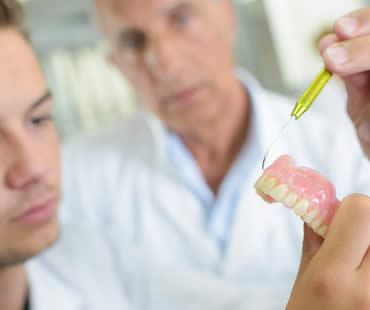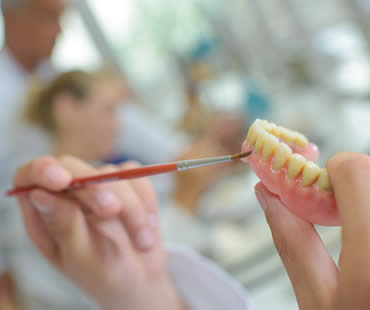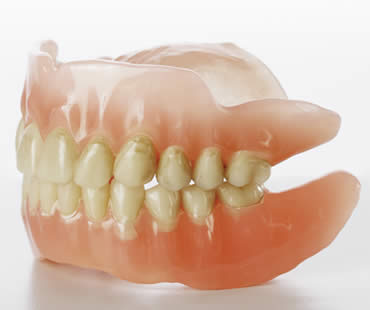
by Dr. Adkins | Feb 28, 2020 | Blog, Dental Topics 2, Dentures
With an estimated 49 million adults in the United States wearing dentures, there are lots of lessons learned about wearing them. Virtually everyone will say that it took a little adjustment time before they were comfortable and confident with their new teeth. It can help to know what to expect with wearing dentures at first.
Your dentures may feel very strange the first day you get them. They can seem too big for your mouth, and as though your lips are out of place. These strange sensations will disappear with time. You may also notice more saliva than usual in your mouth. This is a natural response of your mouth as it grows accustomed to the appliance.
A liquid diet is recommended by many dentists for the first couple of days after getting dentures. Then you may begin eating soft foods, like cooked vegetables, eggs, and fish. Take small bites and chew slowly. Avoid biting into foods with your front teeth.
Mouth soreness from your dentures should go away after a few days. If it lasts longer than a week, call your dentist to ask if you should be seen. You may experience minor mouth sores for the first couple of weeks that you wear dentures. This is normal as you give your mouth time to adjust. If the sores are severe, call your dentist.
Dentists recommend that you remove your dentures for a minimum of eight hours each day to give your gums a rest. Most patients do this at night while sleeping. Your dentist will provide instructions about how to care for your dentures and where to store them when not wearing them. Be sure to follow the instructions for care to ensure that your dentures last as long as possible.
Schedule your appointment at our McDonough dental office

by Dr. Adkins | Jan 10, 2020 | Blog, Dental Topics 2, Dentures
If you have been living with a mouth full of badly decayed teeth, infected gums or painful tooth infections, your dentist may have talked to you about how dentures can transform your smile. While no one wants to extract all of his or her teeth and have no remaining natural teeth, if your teeth have been a source of pain and embarrassment to you for years, having a beautiful new set of dentures could sincerely change your life.
Dentures are very natural-appearing replacements for an entire mouth of missing natural teeth and gum tissue. Dentures are removable and can be cleaned thoroughly each day, unlike examples like dental crowns or dental bridges that are permanently affixed to your mouth.
Badly decayed teeth and other oral issues can lead to chronic pain that spreads from the mouth to other areas of the face, head and neck. This pain can disrupt your life, leaving you irritable and moody, causing you to isolate yourself. Pain medications can lead you to feel groggy or off-balance, affecting your interactions with others in a negative manner. Once those teeth are removed and any underlying infection is addressed, you will be shocked at how much better you feel. The absence of this once-ongoing pain will feel as though you are free of a great burden you hadn’t realized you were carrying.
Years of poor oral health might have left you unwilling to smile broadly, or to be uncomfortable in public speaking, laughing or eating and drinking. You may avoid friends and family and you might choose not to form new relationships easily. Once your damaged teeth have been removed and you have been fitted for dentures, you will be amazed at the “new you.” The bright, perfect white smile that greets you in the mirror may look like a movie star’s smile, but in fact, it’s your smile. With your new dentures, you can feel confident as you move through life.
We look forward to seeing you in our McDonough dental office

by Dr. Adkins | Aug 30, 2019 | Blog, Dental Topics 2, Dentures
An implant overdenture combines the use of traditional dentures and implant technology to create a denture that fits over your remaining natural tooth roots or dental implants. These root or implant supported dentures are held in place by dental attachments which provide excellent stability and support for your dentures. Overdentures were developed to help patients missing some or all of their teeth regain a quality of life that may have been lacking since they lost their teeth.
There are several benefits to implant overdentures when compared to traditional dentures:
- Saving your natural roots or having implants placed slows bone loss by stimulating the bone in your jaw when you eat or chew.
- Because overdentures are better fitting by design, they are more stable and allow you to chew food more thoroughly. This promotes better digestion and allows you to absorb more nutrients.
- The increased stability provided by overdentures also means you are able to speak more clearly, as there is no slipping or clicking of your dentures.
- Loose dentures are not a worry with overdentures. Sticky adhesives and messy denture creams are unnecessary when you have implant overdentures.
- With overdentures, the natural shrinkage that occurs from an under-stimulated jaw does not occur. This keeps your face from looking sunken, as can often happen with traditional dentures.
To find out if you are a candidate for implant overdentures, schedule an evaluation by your dental professional. Overdentures could be the best, most natural treatment for restoring your oral health and beautiful smile.
If you live in the McDonough area contact us today

by Dr. Adkins | Jul 19, 2019 | Blog, Dental Topics 2, Dentures
Thanks to advances in dental technology, dentures are more natural looking and comfortable than ever before. If you are one of the many adults wearing dentures to replace missing teeth, there are several do’s and don’ts you will want to follow to ensure they maintain their fit and your oral health:
- Do take your dentures out before going to bed, allowing your mouth tissues to rest from wearing them all day.
- Don’t let your dentures dry out. Soak them in mild denture solution or water while you sleep.
- Do clean them daily with either a mild detergent or special denture cleaning solution and a soft-bristled brush.
- Don’t soak them in very hot water, as this could cause them to warp, and they will no longer fit properly.
- Do handle them with care. Dropping your dentures or treating them with strong cleansers or harsh brushes can do permanent damage.
- Don’t neglect your oral care for the rest of your mouth. Even patients with a full set of dentures need to take care of their gums, and if you have partial dentures you should continue to brush and floss your remaining teeth regularly.
- Do pay attention to changes in the fit or feel of your dentures. Problems with fit can lead to irritation and discomfort, and could also be an indication of gum disease.
- Don’t try to adjust or repair your dentures on your own. If your dentures are ill-fitting or damaged in any way, schedule an appointment with your dentist to have them evaluated.
- Do continue to see your dentist for regular checkups to help maintain your best oral health and check your dentures for fit and function.
If you are missing all or some of your teeth, dentures can greatly improve both your appearance and the quality of your life. By following these simple guidelines, you can maintain the beauty and functionality of your dentures for many years.
We look forward to seeing you in our McDonough dental office

by Dr. Adkins | Feb 22, 2019 | Blog, Dental Topics 2, Dentures
In the past, replacing lost teeth meant getting dentures or bridges. Even though these offered the best way at the time to restore your mouth’s appearance and function, technology has improved through the development of dental implants. The main drawbacks of bridges and dentures is that they do not feel or look just like real teeth, and it is difficult to chew tough foods. The advantage of implants is that they look and perform so well that you can’t even tell they are not your natural teeth.
Made from titanium, dental implants are screws that are surgically placed directly into your jawbone. They are light and malleable, but durable and strong. The titanium screws are implanted into your jawbone and given time to heal. Once healing is complete, one or multiple crowns are placed on top of the implant to recreate your missing teeth. One implant can hold more than one screw, so it is possible to attach as many crowns as needed to replace your missing teeth.
Dental implants look so much like real teeth that others won’t even be able to tell that you have any artificial teeth. You might even forget about it yourself, as they feel real as well. Since the implants are securely placed in your jaw, they are as strong as real teeth and you are able to chew and bite anything that you would normally eat. Another great thing about implants is that they don’t impact any of your adjacent healthy teeth. While bridges and dentures can sometimes damage neighboring teeth because those teeth are necessary for support, implants avoid this problem. You are left with a fully restored and comfortable smile.
We treat patients from McDonough and the surrounding area

by Dr. Adkins | Jan 25, 2019 | Blog, Dental Topics 2, Dentures
No matter how much you want to preserve your real teeth, it’s not uncommon for people to lose teeth. It may occur with age, decay, gum disease, or injury. If this happens to you, there’s no reason to go through life missing teeth in your smile. It’s better to quickly see your dentist for replacement teeth, so that you avoid shifting of your remaining teeth, speech problems, or saggy facial muscles. One solution that your dentist will likely offer to restore your smile is dentures. Here are some tips to help you select the right dentures for you.
Dentist
An important step in the process of getting dentures is making sure you have a qualified and experienced dentist treating you. Most dentists provide dentures as part of their services, or you may choose to go to a prosthodontist. This type of specialist focuses on restorative dentistry. No matter who you choose, make sure that you are confident you will get dentures that meet your specific goals and needs.
Type of dentures
There are several types of dentures available, each with their own attributes. These are the main kinds:
- Full dentures – an acrylic appliance that replaces all of the teeth in your upper jaw. These are functional and replicate your real teeth, and are usually comfortable when fitted correctly.
- Partial dentures – these replace one or two missing teeth using a dental arch. Partial dentures are made of acrylic, metal, plastic, or a combination of these materials. These are attached with a clip that holds them in place in your mouth.
- Permanent dentures – these dentures are permanently attached and require almost no maintenance. They are the costliest of the types of dentures.
Color
Dentures are available in various shades of white so that you can select the color that is most natural for you. Be careful about choosing the brightest white color, which may look unnatural compared to the color of your real teeth. Your dentist will help you find a neutral color that looks best with your smile and complexion.
If you need a dentist in McDonough contact us today








 770-957-5214
770-957-5214  E-Mail Us
E-Mail Us 
